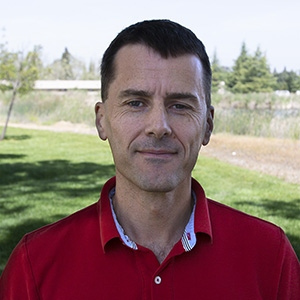Nicolas Schunck

February 17, 2023
What do you like about working at the Lab?
At the Laboratory, we have the opportunity to tackle some of the most challenging scientific problems of our time. This is a curse (it's not easy) and a blessing (it matters). In my case, I work on understanding the fundamental mechanisms of nuclear fission. Fission, and nuclear reactions in general, are qualitatively well understood, but developing sufficiently precise theoretical models for relevant applications at the Lab is extraordinarily difficult. It requires sustained investments, sometimes over decades, which would be difficult to secure in an academic environment. This long-term perspective is one of the things I like the most about the Laboratory.
What do your day-to-day work activities include?
I wish I could say that I sit at my desk and ponder about atomic nuclei. Sadly, this is not the case, as there are many other pressing items that require my attention. Instead, I write a lot of emails throughout the day and attend (too many) meetings. Some of meetings are on mundane administrative topics like office space, others are more stimulating and involve brainstorming to solve a problem. Other times, I am working to improve and debug my programs, which does take a good amount of my time. Like every other scientist, an article or proposal will come my way that requires my review. Depending on the time of the year, I may also have to prepare a rather large number of reports, proposals, or slides for various people.
What is one project you’re really proud to have worked on?
There is no single project that I am really proud to have worked on. In fact, it is quite the opposite: what I am most proud of is that I have been able to (so far) work on multiple projects beyond my comfort zone. I have been working on modernizing our computer codes to adapt them on the advanced architectures pioneered at the Laboratory. Additionally, I have been exploring how machine learning techniques can be applied to solve some of the problems we have in nuclear theory. Most recently, I am interacting with experimentalists a lot more to learn how to produce quality nuclear data for applications. This variety keeps life interesting.
What is your educational or career background?
I am a standard product of the French educational system—I did the first two years of my undergraduate studies in what are called 'Classes Preparatoires aux Grandes Ecoles' in Bordeaux. I obtained a bachelor's in physics, master's in nuclear physics, and a physics engineering degree at the University of Strasbourg. After receiving a PhD in theoretical nuclear physics from the same university, I did a string of postdocs at the University of Surrey (UK), Universidad Autonoma de Madrid (Spain), and University of Tennessee. I then joined the Lab in 2010 as a staff scientist in the nuclear data and theory group.
What inspired you to go into science/your field of work?
As a child, most of us never stopped asking our parents and teachers (or any grown-up around us) questions about why things are the way they are. I guess I was never satisfied with whatever answer I was given, so I have continued to ask myself questions ever since. Science can be very frustrating, but the few answers that sometimes trickle out of my research bring a very soothing sense of order into the chaos that is the universe. This strange reason of why I got into science in the first place may also explain why I specialized in theoretical physics.
What advice would you give to a new employee at the Lab?
I arrived at the Lab already as a seasoned physicist with a good network of collaborators, some relatively clear ideas about my research, and a decent amount of experience in the research community. This probably made the transition much easier than if I had joined fresh out of grad school. My main focus in the first few years was to understand the sometimes arcane system of funding, learn at least a subset of the zillions of acronyms used here, and generally speaking—adapt myself to an organization that is different from a university or a basic science institute. As a Laboratory employee, we are part of a team, and the first thing to do is learn about the team.
What are your hobbies/what do you do in your free time?
I try to convince my body that it can still sustain the same amount of sport as when I was a teenager. It usually fails, so I also spend a lot of time reading books.
Learn more about Nicolas:
Biography




